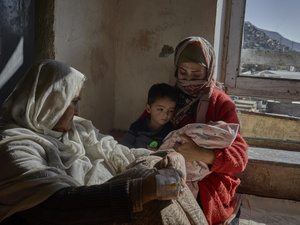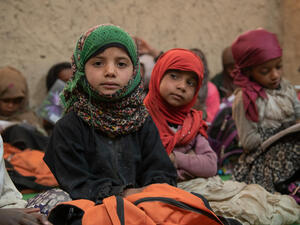Peace deal brings little comfort to displaced in North Kivu
Peace deal brings little comfort to displaced in North Kivu

Displaced people queue up for assistance at the church in Kiwanja, North Kivu.
RUTSHURU, Democratic Republic of the Congo, February 4 (UNHCR) - Forty-year-old Fabukuze Ulimubenchi suffered a miscarriage and lost contact with her two children after fleeing her home in troubled North Kivu province last week.
"We fled in different directions when we heard gunshots. I am not even sure my [two] children are with their father," the tearful woman said as she queued up to receive aid at a Catholic church in Kiwanja, the main town in North Kivu's Rutshuru district. UNHCR is providing protection services.
She was among more than 2,700 people, mostly women, who fled their homes to escape clashes between rival armed groups in the volatile province in eastern Democratic Republic of the Congo (DRC).
The fresh fighting came barely two weeks after the government signed a peace accord with some 20 armed groups in a bid to end the endless cycle of violence that has left an estimated 800,000 people homeless in North Kivu, including some 400,000 over the past year.
The UN refugee agency was among those to welcome the signing of the accord on January 23 in the North Kivu capital of Goma, which lies some 70 kilometres south of Rutshuru. It called, among other things, for the return home of the internally displaced as well as refugees in neighbouring countries.
This goal might seem a long way off to Ulimubenchi and other women forced to flee last week's fighting between forces loyal to renegade general, Laurent Nkunda, and Mai Mai militia groups.
But they desperately want an end to the violence. "Give us peace so we can return to our homes," begged 71-year-old Teresa Ndahiliwe, who said that for the last three days she had been surviving without food or blankets and was suffering in the cold nights.
The IDPs feared that more fighting was on the way, saying that new armed groups unhappy with the peace accord were appearing in Rutshuru and Masisi districts, where much of the latest displacement has been recorded.
Some IDP leaders said they felt let down by the rival armed groups. "They are hypocrites, they are not sincere. They have let us down," said one IDP leader from Binza, 40 kilometres west of Kiwanja.
Residents around Kiwanja also face the threat of livestock rustlers, while cases of rape and forced labour are frequently reported. Male IDPs sheltering in public buildings are vulnerable to being press-ganged by armed groups.
The local authorities and the Congolese military have vowed to pursue armed bandits. "We have asked community leaders to report bandits. We will pursue them wherever they might be," said one police official.
UNHCR, meanwhile is trying to reach out to more of the internally displaced in North Kivu. The agency helps manage 11 IDP sites around Goma, Rutshuru and Masisi.
"In order to effectively respond to the protection needs of the civilian population and to prepare for the return of the IDPs and refugees, UNHCR is reinforcing its presence in the field. We are planning to establish two additional offices in Masisi, apart from Beni and Rutshuru territories of North Kivu," said Masako Yonekawa, head of the UNHCR field office in Goma.
UNHCR and its partners are also looking for space to house new IDP arrivals. "If the authorities in Goma do not push for more space, IDPs will continue to live in deplorable conditions," said UNHCR field officer, Marie-Antoinette Okimba.
Meanwhile, UNHCR on January 30 began re-registering tens of thousands of IDPs living in organized and spontaneous sites in North Kivu. An estimated 30 percent, or around 130,000, of the displaced persons in the province live in the 11 UNHCR-assisted IDP sites.
The exercise, involving 60 staff, began in the Mugunga I site west of Goma. Some 10,000 people were re-registered compared to a previous population of about 19,000. Similar patters were found at Mugunga II site and at Rutshuru.
Explaining why the figures had dropped by about 50 percent, UNHCR officials said that some IDPs around Goma might have moved in with friends or relatives. "We are focusing the exercise on those who live and spend nights on the sites," said one official.
By David Nthengwe in Rutshuru, Democratic Republic of the Congo









